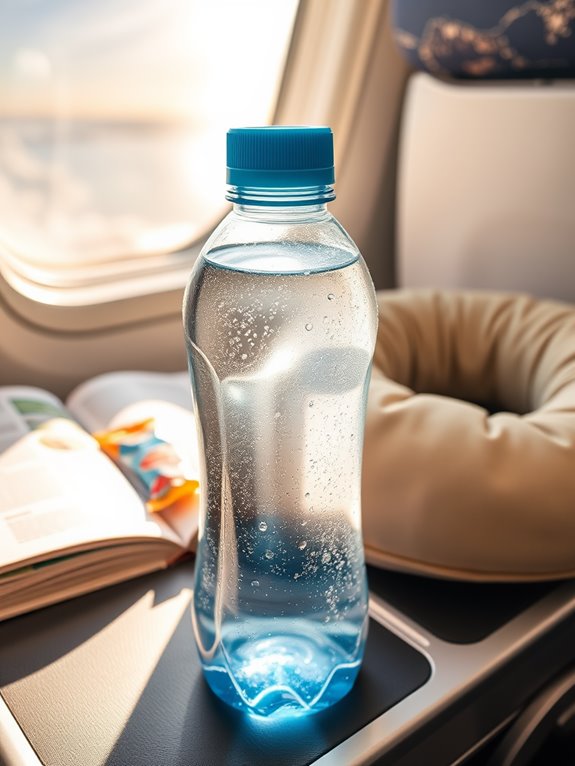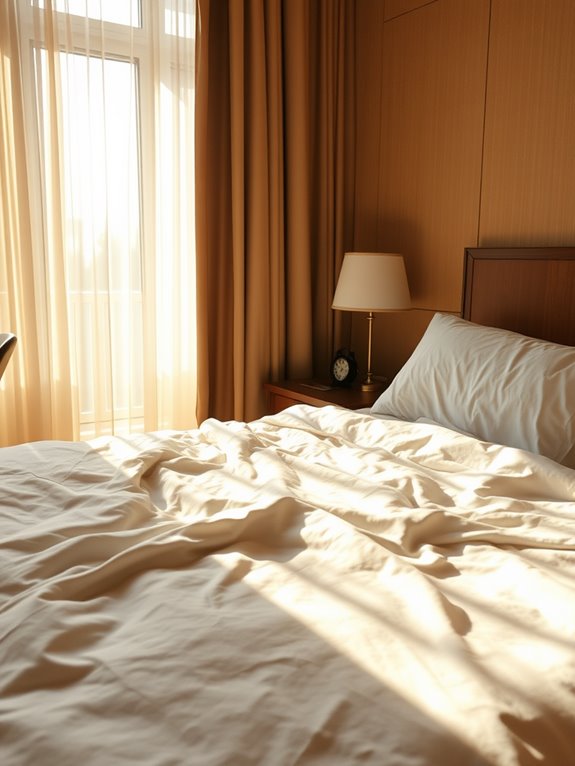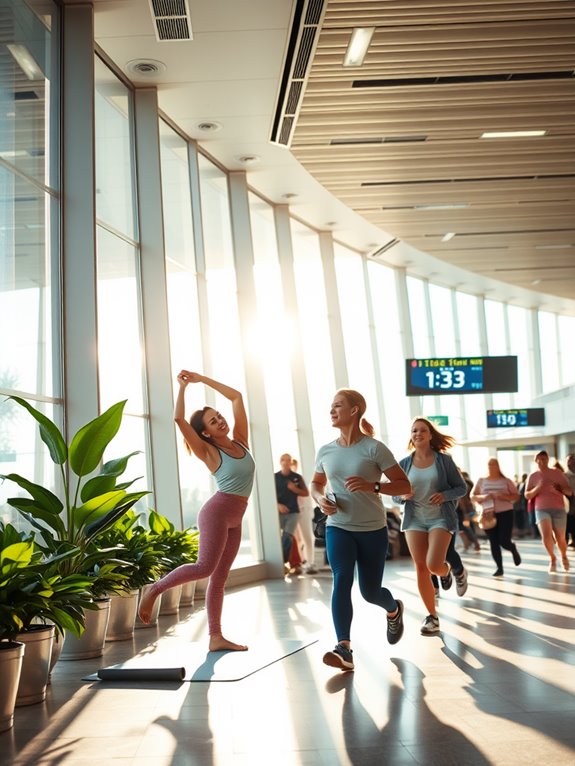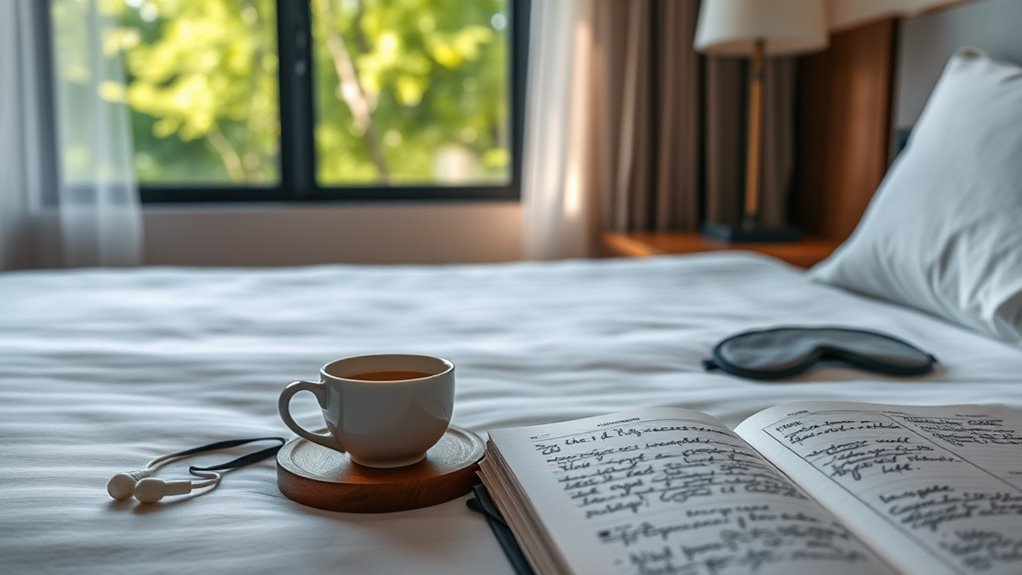To beat jet lag effectively and cheaply, adjust your sleep schedule a few days before you leave. Stay hydrated during your flight, and avoid alcohol and caffeine that disrupt sleep. Consider using melatonin supplements and natural sleep aids like herbal teas. Get plenty of sunlight upon arrival, and don’t forget to take short naps if you’re feeling groggy. Stay active and eat light, healthy meals to keep your energy up. There’s much more to discover!
Nomad Highlights
- Adjust your sleep schedule by shifting bedtime and wake-up time 15-30 minutes daily for three days before traveling.
- Stay hydrated by drinking at least eight ounces of water hourly and consuming nutrient-dense foods like leafy greens and berries.
- Avoid alcohol and caffeine, opting for herbal teas to promote relaxation and better sleep quality during travel.
- Use sunlight exposure and short afternoon naps to help reset your internal clock and recharge energy levels.
- Incorporate physical activity, like walking or yoga, to reduce jet lag effects and boost overall mood during your trip.
Adjust Your Sleep Schedule Before Departure

To minimize jet lag, you’ll want to start adjusting your sleep schedule a few days before you leave. Gradually shift your bedtime and wake-up time by 15 to 30 minutes each day, aligning them with your destination’s time zone. This proactive pre-flight preparation helps your body acclimate to the new schedule.
Create a conducive sleep environment by dimming the lights, reducing noise, and keeping your room at a comfortable temperature. Consider using blackout curtains or an eye mask to block out distractions, as effective light blocking can significantly improve your sleep quality. Additionally, wearing blue light blocking glasses before bedtime can help mitigate the impact of screens on your natural sleep cycle. Regular use of these glasses can also reduce eye strain caused by prolonged screen exposure, helping you feel more relaxed. By incorporating guided relaxation techniques into your routine, you can further enhance your ability to unwind and prepare for sleep. By taking these steps, you’ll optimize your rest and arrive at your destination feeling more refreshed and ready to explore. Incorporating self-care practices into your travel routine can further enhance your overall well-being during the transition.
Stay Hydrated During Your Flight

While you navigate the skies, staying hydrated is essential to ward off the fatigue and discomfort that often accompany jet lag.
Begin your journey by filling a reusable water bottle; this not only helps you sip regularly but also cuts down on waste. During your flight, aim for at least eight ounces of water every hour. Personal air purifiers can also enhance your travel experience by improving the air quality around you. Additionally, consuming caffeine-free herbal teas can promote relaxation and improve sleep quality, further aiding in your recovery from jet lag. Staying hydrated is particularly important when considering the effects of insulation performance, as it can help maintain your energy levels. Moreover, remember that surge protection ratings can be crucial for keeping your devices safe while you stay connected during your journey.
Consider incorporating electrolyte drinks into your hydration routine, as they replenish essential minerals lost during air travel. These drinks can enhance your hydration, keeping you alert and energized.
Keep an eye on your body’s signals—if you feel thirsty, drink up! By prioritizing hydration, you’ll arrive at your destination feeling refreshed, ready to embrace new adventures, and minimize the impact of jet lag. Additionally, carrying a portable power bank can help ensure your devices remain charged, allowing you to access hydration tips and travel resources during your journey.
Avoid Alcohol and Caffeine

Although it might be tempting to indulge in a cocktail or a cup of coffee during your flight, steering clear of alcohol and caffeine can greatly ease the effects of jet lag.
Both substances can disrupt your sleep patterns and dehydrate you, making it harder to adjust to a new time zone. Instead, consider caffeine alternatives like herbal teas or infused water to stay refreshed without the jitters. Using a good quality herbal tea infuser can enhance your brewing experience and ensure a cleaner cup. Incorporating calming essential oils, such as Sweet Orange oil, can further promote relaxation during your travels, as these oils provide soothing properties that can help alleviate stress. Snack bars with low glycemic index options can also provide a nutritious energy source while you travel.
These options promote relaxation and help maintain hydration. Your body craves balance after long hours of travel, and avoiding alcohol effects can enhance your overall well-being. Additionally, maintaining proper hydration is crucial for energy levels during your travels.
Use Sleep Aids Wisely

Here are some sleep aid types and dosage guidelines to take into account:
- Melatonin: A natural hormone, take 1-3 mg about 30 minutes before bedtime to help reset your internal clock. Many people find that melatonin can be effective for jet lag when used properly. Consistency in dosage may enhance its effectiveness over time. Additionally, proper webcam cover installation can help ensure a secure environment for your devices during your travels.
- Valerian Root: This herbal remedy can promote relaxation; try 300-600 mg about an hour before sleep.
- Diphenhydramine: Found in over-the-counter products, stick to 25-50 mg as needed, but avoid prolonged use.
- Prescription medications: Consult your doctor for personalized dosage guidelines and potential side effects. Regular use of sleep aids can lead to improved muscle relaxation and overall sleep quality.
Additionally, incorporating natural sleep aids into your routine can enhance your overall sleep quality and help combat jet lag more effectively.
Get Plenty of Sunlight

After considering sleep aids to help you adjust, don’t underestimate the power of natural light in combating jet lag.
Sunlight exposure can notably influence your body’s internal clock, making it easier for you to adapt to a new time zone. Step outside and soak in the morning sun; it’ll energize you and signal to your body that it’s time to wake up. Incorporating unique products for every lifestyle can also support your overall well-being while traveling. Additionally, spending time outdoors can boost your mood and reduce feelings of anxiety and stress, which can help in managing jet lag. Research shows that natural light exposure can enhance your mood and cognitive function, making it a crucial element in your travel routine. Moreover, maintaining a consistent sleep schedule can further strengthen your body’s circadian rhythm and improve overall sleep quality.
Aim for at least 30 minutes of sunlight exposure daily, especially during the early hours, to align your circadian rhythm. If you arrive at your destination before dark, take a stroll or find a café with outdoor seating.
Embracing natural light isn’t just invigorating; it’s an innovative way to reset your body and banish that dragging jet lag feeling. Additionally, consider unique products for your lifestyle that can enhance your travel experience while managing jet lag.
Take Short Naps

When you’re fighting jet lag, short naps can be your secret weapon. Time them wisely, aiming for the early afternoon to avoid disrupting your nighttime sleep. Just keep them brief—around 20 to 30 minutes—to recharge without feeling groggy. Incorporating acupressure mats into your relaxation routine may also enhance your ability to recover from jet lag. Additionally, maintaining optimal humidity levels during your travels can further improve your overall comfort and help mitigate the effects of jet lag. Staying hydrated with portable water purifiers can also support your recovery by ensuring you have access to clean water, especially during long flights. Utilizing UVC technology for sanitizing personal items while traveling can also help reduce the risk of illness, further aiding in your recovery from jet lag. Having a compact first aid kit can provide peace of mind during your travels, ensuring you’re prepared for minor injuries that may occur along the way.
Time Your Naps Wisely
To effectively combat jet lag, timing your naps can make all the difference in helping you adjust to a new time zone. By practicing strategic timing, you’ll enhance your ability to recover quickly.
Here are four tips for napping wisely:
- Choose the Right Time: Nap between 1 PM and 3 PM when energy dips occur naturally.
- Keep It Short: Aim for 20-30 minutes to avoid grogginess and maintain alertness. Using a biofeedback device can also help monitor your stress levels during this time. Incorporating ankle resistance bands into your workout routine can also enhance overall muscle strength, which can support better sleep. Research shows that AI tools can assist in managing your daily schedule to optimize rest.
- Create a Relaxing Environment: Dim the lights and find a quiet place to maximize rest.
- Avoid Late Naps: Napping too close to bedtime can disrupt your sleep cycle. Additionally, tracking your sleep with a fitness tracker can provide insights on your overall rest quality and help optimize your napping strategy. Incorporating features like continuous health monitoring ensures you can keep track of your heart rate and sleep patterns while adjusting to the new time zone.
Limit Nap Duration
While timing your naps wisely sets a solid foundation for combating jet lag, limiting their duration is just as important.
Short, strategic naps can act as powerful refreshers, helping you recharge without plunging into deep sleep that disrupts your nighttime rest. Aim for 20 to 30 minutes; this window allows your body to rejuvenate without entering sleep cycles.
By using these nap strategies, you’ll feel invigorated and ready to tackle the day ahead. Remember, the key lies in ideal timing—nap too late in the day, and you risk interfering with your nighttime sleep.
Eat Light and Healthy Meals

Eating light and healthy meals can make a world of difference in how you feel during your travels.
By choosing nutrient-dense foods and staying hydrated, you’ll fuel your body without weighing yourself down.
Avoiding heavy, greasy meals not only keeps your energy levels stable but also helps you adapt to new time zones more easily.
Choose Nutrient-Dense Foods
Choosing nutrient-dense foods can greatly ease your body’s adjustment to new time zones, helping you combat the effects of jet lag more effectively.
Focus on meal planning that prioritizes nutrient timing to give your body the fuel it needs. Here are four excellent options:
- Leafy Greens: Packed with antioxidants, they reduce inflammation and boost energy levels.
- Quinoa: A complete protein, it stabilizes blood sugar and keeps you feeling full longer.
- Berries: Rich in vitamins, they support brain function and help fight fatigue.
- Fatty Fish: High in omega-3s, they enhance mood and improve sleep quality.
Stay Hydrated Throughout Travel
Staying hydrated throughout your travels is essential for minimizing the effects of jet lag. Dehydration can exacerbate fatigue, so aim to boost your water intake. Carry a reusable water bottle and fill it up whenever you can—this simple step keeps hydration top of mind.
Consider sipping herbal teas or coconut water for variety, providing electrolytes while staying invigorating.
To enhance your hydration efforts, set reminders on your phone to drink water regularly. Incorporate hydration-rich snacks, like cucumbers or oranges, into your travel routine.
Avoid excessive caffeine and alcohol, as they can lead to dehydration. By following these hydration tips, you’ll arrive at your destination feeling fresher and ready to embrace new time zones with energy and enthusiasm.
Avoid Heavy, Greasy Meals
One of the best strategies for combating jet lag is to avoid heavy, greasy meals during your journey. Instead, focus on light and healthy meals that support your body’s rhythm.
Meal timing plays an essential role in how your body adapts to new time zones. Here are some smart food choices to reflect on:
- Fresh fruits – They’re hydrating and rich in vitamins.
- Lean proteins – Think grilled chicken or fish for energy without heaviness.
- Whole grains – Opt for quinoa or brown rice to keep you satisfied.
- Vegetable salads – Packed with nutrients, they’re easy to digest.
Stay Active During Your Trip

Keeping your body moving during your trip can greatly reduce the effects of jet lag. Engaging in active exploration not only helps you acclimate to your new environment but also boosts your energy levels.
Whether you’re hiking through scenic trails or cycling along picturesque streets, these fitness activities keep your blood pumping and your mind alert. Consider joining a local yoga class or taking a fun dance lesson to immerse yourself in the culture while staying active.
Don’t forget to squeeze in short workouts or brisk walks between sightseeing adventures, as these bursts of movement can enhance your mood and help regulate your sleep cycle.
Staying active is a dynamic way to combat jet lag and make the most of your travels.
Consider Melatonin Supplements

After a day of exploring and staying active, you might find that your body still struggles to adjust to the new time zone. That’s where melatonin supplements come in handy. This natural hormone can aid your body’s sleep-wake cycle, helping you reset your internal clock efficiently.
Here’s what to reflect on:
- Melatonin Dosage: Start with a low dose, around 0.5 to 3 mg, to see how your body reacts.
- Timing: Take melatonin about 30 minutes before your desired bedtime in the new time zone.
- Natural Alternatives: Look into herbal teas like chamomile or valerian root as complementary options.
- Consult a Professional: Always check with a healthcare provider before starting any supplement.
With these tips, you’ll be on your way to conquering jet lag more effectively!
Frequently Asked Questions
How Long Does Jet Lag Typically Last?
Jet lag typically lasts a few days, but it can vary depending on how many time zones you’ve crossed.
You might experience jet lag symptoms like fatigue, irritability, or difficulty concentrating. Recovery often takes about a day for each time zone crossed.
To speed up your adjustment, you can try to sync your sleep schedule with your destination before you travel.
Listening to your body’s cues can make a significant difference in how quickly you recover.
Can Jet Lag Affect Mental Health?
Imagine your mind like a finely tuned orchestra, suddenly out of sync. Jet lag symptoms can disrupt that harmony, leading to fatigue, irritability, and difficulty concentrating.
You mightn’t realize it, but this disruption can take a toll on your mental health, making feelings of anxiety and depression more pronounced.
Are Certain Age Groups More Affected by Jet Lag?
Jet lag affects different age groups in varying degrees. You might find that younger individuals, particularly youth, show greater sensitivity to time zone changes. Their bodies are still adjusting to sleep patterns, making them more vulnerable to the disruptive effects of travel.
Conversely, older adults may adapt more easily, thanks to established routines. Understanding this age impact can help you tailor your travel plans for a smoother adjustment across time zones, ensuring a more enjoyable journey.
Is Jet Lag Worse When Traveling East or West?
Studies show that about 80% of travelers experience jet lag symptoms.
When you travel eastward, your body’s internal clock struggles to adapt more than with westward travel. This happens because you’re losing hours, which can be tougher for your circadian rhythm.
You might feel more fatigued and disoriented after an eastward journey.
Can Pets Experience Jet Lag Too?
Yes, pets can experience jet lag too! When you travel with your furry friend, changes in time zones can disrupt their natural rhythms.
You might notice shifts in their sleeping patterns or increased anxiety. Animals, like humans, respond to their environment, and travel can alter their behavior.
To help your pet adjust, gradually acclimate them to the new time zone before your journey. This way, you can both enjoy a smoother shift during your travels!
Conclusion
So there you have it—your ultimate arsenal against the tyranny of jet lag! Armed with these cheap and effective strategies, you’ll transform into a superhuman traveler, gliding through time zones like a seasoned pro. Imagine waking up refreshed, ready to conquer new adventures instead of battling fatigue! By adjusting your sleep, staying hydrated, and soaking up sunlight, you’ll beat jet lag into submission. Get ready to explore the world with energy that could power a small city!




